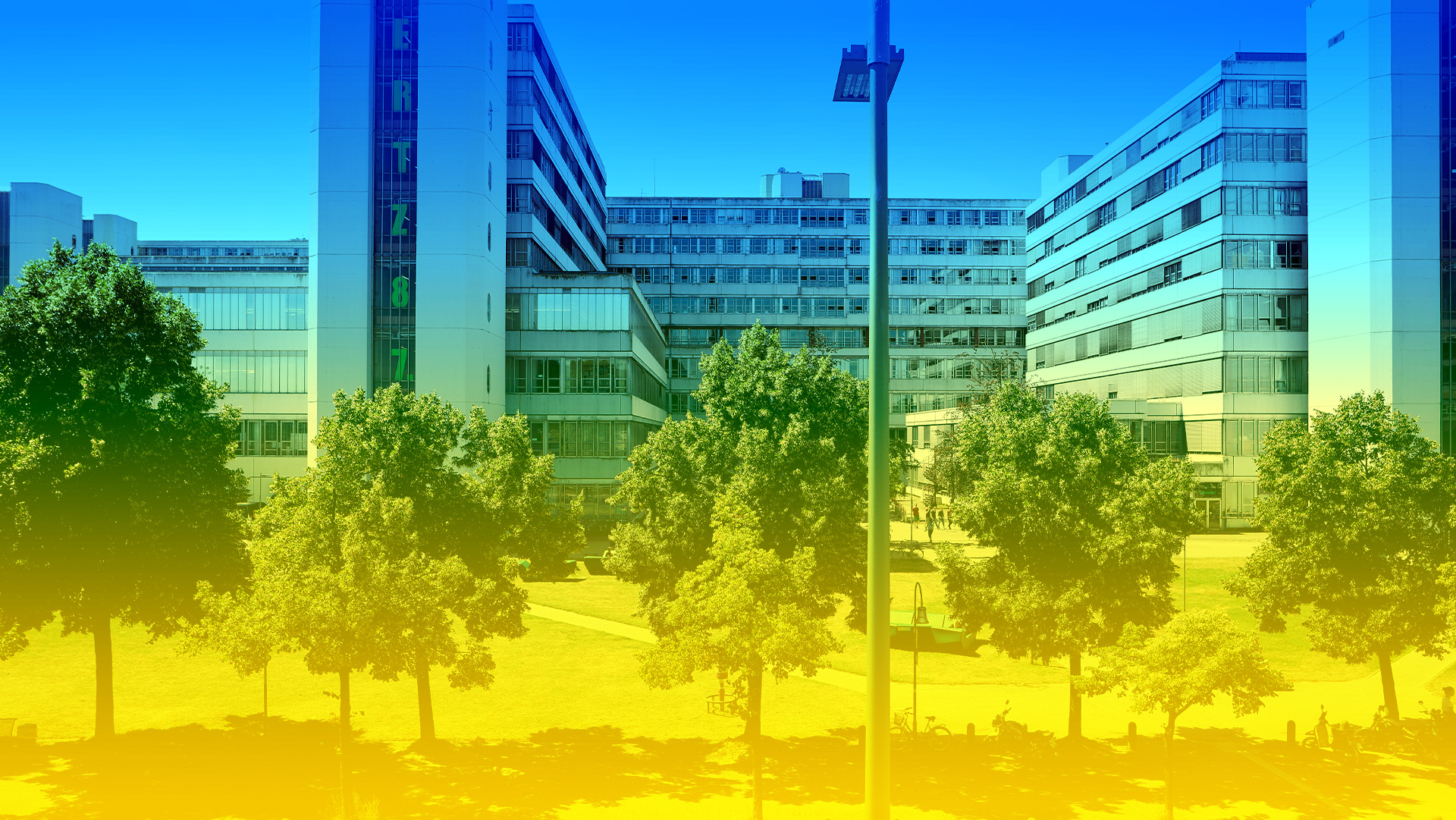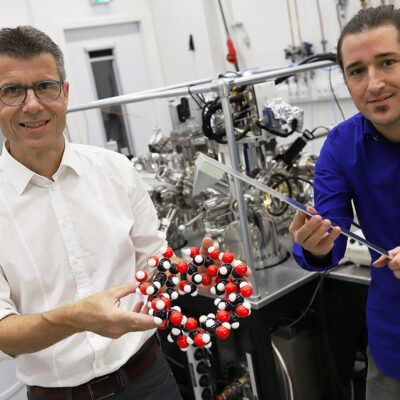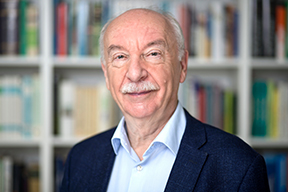‘Dictators do what they say and say what they do. That’s what the 20th century taught us,’ says histori-an Professor Dr Christina Morina from Bielefeld University. She explains how lessons for the present and the future can be derived from these experiences, also with regard to the Ukraine war. ‘We know from history that dictators tend to disregard and cross internal and external borders for as long as they are not met with effective resistance.’ During the interview, the academic talks about why the compar-ison to the Second World War can be instructive—despite overwhelming differences—and gives her assessment of the current situation.
What parallels do you see between the Ukraine war and the Second World War?
What is striking is the ethnic-imperial logic used to justify both wars: Putin argues that the exist-ing national borders do not do justice to Russia, that Russia is bigger than the current borders. At the same time, he does not recognise Ukraine’s sovereignty as an independent state. He sees it as an artificial construct, steered by the West and led by Nazis, and the Ukrainian popu-lation as a ‘brother nation’. He also claims the Russians living there are under threat and justi-fies the invasion of his army with this bundle of pretexts. Hitler used a similar argument at the beginning of the Second World War: in the alleged interest of his own people, the ‘Lebensraum’ to which the Germans were supposedly entitled was enlarged by force, surrounding countries were annexed into his sphere of influence, existing treaties were broken and—on several fronts—an open war of aggression was waged.
What differences do you see?
I see two key differences in the relevance of military alliances and in the availability of nuclear weapons. Ukraine is currently not part of any military alliance and does not belong to NATO. This makes the Ukraine war first and foremost a conflict between two states that is limited to the region. The outbreak of the Second World War, on the other hand, was largely contingent on a different logic of pacts and alliances. Through this alliance logic, the German war of ag-gression against Poland in September 1939 quickly grew into a multi-state conflict with conti-nental, and ultimately, global reach.
Another difference is the availability of nuclear weapons today. Russia is a nuclear power, and this fact has overshadowed the current conflict from the beginning. In the Second World War, however, it was only at the end that nuclear weapons played a decisive role. So the question today is how to deal with the fact that Putin can deploy nuclear weapons at any time and uses them as a threat. Faced with this horror scenario, Western states are, of course, carefully weighing up what support for Ukraine might consist of and what consequences it might have.
When it comes to the question of how allies should react to the Ukraine war, many people are longing for guidance in the current situation. What can we learn from the past?
After the Second World War, it was discussed, for example, how Hitler’s radicalism and limit-less thirst for power could have been underestimated to such a dramatic extent. I believe that one result of this intense debate is the realisation that dictators overwhelmingly tend to do what they say and say what they do. If we want to speak of ‘lessons of the 20th century’ at all, then this is certainly an insight worth considering. So when Putin talks about Ukraine having no right to exist, or about an empire stretching ‘from Lisbon to Vladivostok’, these statements should be taken very seriously.
In your opinion, what is the Federal Government’s negotiating position?
It’s hard for me to tell from a distance. Dictators test boundaries constantly and usually contin-ue until they are met with effective resistance. At the same time, it is very difficult to say what ‘goal’ Putin would be satisfied with. That said, I think it is a mistake to hope that he will stop the war of his own accord. The most successful measures are probably powerful resistance by Ukraine and a strong counter-reaction by governments in the Western world which designates red lines clearly. Putin has not attacked any NATO countries so far; he quite obviously accepts the inviolability of their borders because the allied political, economic, and military power be-hind them acts as a deterrent. From my point of view, this aggression should be countered in a much more resolute way and with a very clear strategy.
What scenarios do you think are conceivable for the outcome of the war?
As a historian, I can only tell you what I fear and what I hope for. I am afraid the Ukraine war might continue for years. All the while, the economic consequences of the sanctions are be-coming an increasing burden for the sanctioning states. Right now, we see this in energy and food prices, for example: rising gas prices are now dominating the news, while the continuing horrors of the war are fading into the background. We may reach a point where governments are pushing for a ceasefire, regardless of the course of the war, because the economic and social concerns are so severe. This would result in a frozen war. That would be understandable, but fatal for Ukraine, and I would also consider it politically misguided.
However, I hope that Ukraine has a real chance of joining the EU and that all Eastern European countries will have a sovereign voice within Europe in the future and thus finally a say that is in keeping with their respective status. For far too long, too many EU states have not listened enough to the voices and concerns of Eastern European countries. Why this is so, even and especially in Germany, and why the premises of Germany’s Russia policy were revised far too late, although they were always the subject of well-founded criticism, is a question that is as important as it is unresolved. Thinking that Russia under Putin could be ‘contained’ through economic relations and democratised from the outside, so to speak, was a dangerously mis-guided assumption. It is an important task, not least for historians, to review how these mis-conceptions could have come about.
But every historical event has its own context and its own dynamics. The political and military alliance constellations, the economic situation, the government’s ability to communicate, a possible change in the population’s attitude towards the war and, last but not least, the war itself are some of the factors on which the further development of this conflict depends. It is open or contingent, as historians would say. This also means that we can influence it. If we were to look for some measure of hope in the experiences of the 20th century, I would point to the fact that, overall, liberal, democratic societies have proven to be the more stable ones so far. A society based on fear, violence and internal and external repression is always latently unstable and can’t function in the long run.
About this series
In these interviews, academics at the university explain their assessment of the war in Ukraine from the perspective of their own disciplines. Previously published interviews:
- Junior Professor Dr. Julian Hinz (14.06.22): ‘Russia has gambled away its economic future’
- Professor Dr med. Oliver Razum (24.05.22): ‘Making healthcare more equitable for refugees’
- Dr Leif Seibert (12.05.2022): ‘Putin and Kirill benefit from mutual legiti-mation’
- Professor Dr Véronique Zanetti (14.04.2022): ‘A nuclear war must be avoided at all costs’
- Professor Dr Andreas Zick (25.03.2022): ‘We need to know where more violence is brewing’
- Professor Dr Frank Grüner (31.03.2022): ‘Putin is distorting history for his own ends’






